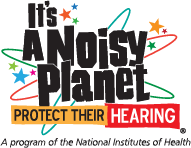As educators, health care providers, and community and youth program leaders, you have many opportunities to teach children about noise-induced hearing loss. You can encourage children to develop healthy hearing behaviors before they form habits that can lead to permanent hearing loss. Our resources will help you incorporate healthy hearing messages into your daily interactions with kids.

Get Tips To Teach Kids
We want kids to keep hearing the sounds they love. There are many opportunities to teach children how to protect their hearing at school, at youth and community programs and gatherings, and at health care facilities. Learn how to teach kids to protect their hearing.
Have You Heard?
Learn more about the sounds around us and how they can hurt our hearing.
- Do mice snore? Are cicadas really as loud as a rock concert? Read about and share these topics and other interesting stories about sounds, noise, and hearing health in our Have You Heard? section.
- Get up-to-date information on noise-induced hearing loss sent directly to your inbox. Sign up for our e-mail newsletter.
- Like what you hear? Like us and share our posts on Facebook.
Get Noisy Planet Materials
Our resources—bookmarks, posters, fact sheets, and other products—are available for free to help you educate youth and encourage healthy hearing habits.
- Order free Noisy Planet resources.
- Download our multimedia content to promote healthy hearing on your website and social media platforms.
Using This Website with Kids
Noisy Planet offers information and free resources to help you engage kids. Learn more about all the resources available on the Noisy Planet website.
Find Curricula and Other Resources
In addition to the resources Noisy Planet offers, several organizations have developed more information to help you teach youth about hearing and hearing loss from noise.
- Dangerous Decibels
Dangerous Decibels is a public health campaign to prevent hearing loss and tinnitus (ringing in the ear) by enhancing knowledge and changing attitudes and behaviors of school-aged children.- The Classroom Program uses the principles of inquiry-based learning to teach the concepts of noise-induced hearing loss prevention. Students discover how important it can be to “Turn it down, walk away, and protect your ears.”
- The Educator Training Workshops prepare and equip educators to present a K-12 classroom presentation that is effective at enhancing knowledge and changing attitudes and intended behaviors in students regarding their hearing health.
- National Hearing Conservation Association
The National Hearing Conservation Association has educator resources such as a Noise Navigator spreadsheet and an audio simulation of tinnitus.



